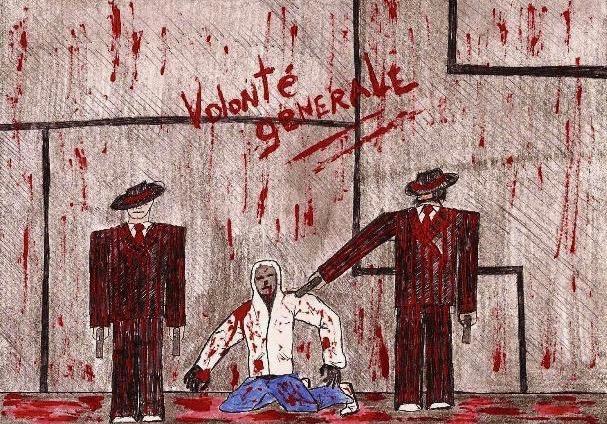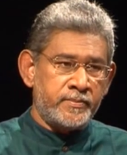The Great Gramsci: Imagining an Alt-Left Project
archive


The Great Gramsci: Imagining an Alt-Left Project
In the construction of a new public imagination, as in every other form of human endeavor, you are caught between two realities: you have to go back to where you got it wrong, but you can’t go back home again.
Today’s political crisis involves responses to the realities of our time, the current world order in both its political and economic dimensions, which some Marxists might define as neoliberal imperialism. “Our time” here refers to the history of the world after the fall of global socialism. On the left or progressive center-left, there is an absence of global public imagination. Or rather, it is no longer “global.” What we have are competing blocs of opinion, each of which contains legitimate and justifiable elements. But these competing and internally contradictory blocs of opinion collide and collude, forming unprecedentedly complex, heterodox, and fluid patterns.
Meanwhile, as the century and the millennium turned, progressivism was being identified with liberalism, and liberalism with the neoliberal status quo. What we didn’t know from the outside was that, devoid of a viable progressive alternative, the neoliberal world order was spawning a new fundamentalism within what Jose Marti called “the belly of the beast.” A strange mutation occurred in which stances that were once antithetical began to meld. Those of us who lived in either the Third world or the Second saw a merger of human rights and military interventionism, resulting in the devastation of states and societies. The political options that we supported in the West, those of Clinton and Blair, became a grotesque nightmare. And soon we were caught between two nightmares: western (neo)liberal interventionism on the one hand, and on the other the Frankenstein it spawned, namely radical Islamist terrorism—a religious version of Pol Pot’s Khmer Rouge, which likewise had mutated into a radically evil force in the wake of misguided interventionism from the West.
If both sides of this state of affairs, both the right and the left, have some elements of legitimacy, is it possible to pull them together? Perhaps, but somewhere along the line, perhaps in reaction to class reductionism, the leftwing political movements in the West forgot about class and substituted identity and gender instead. The right picked it up. The left also forgot about nation and patriotism—and the right picked them up as well. Meanwhile, if you were in the Third or Second worlds, the radical religious right picked them up.
On the left or progressive center-left, there is an absence of global public imagination. Or rather, it is no longer “global.” What we have are competing blocs of opinion, each of which contains legitimate and justifiable elements.
We on the left were accustomed to Democratic New Mandarins—the “best and the brightest” who took us into Vietnam—and we had lived through Republican administrations that made diplomatic breakthroughs to Russia and China. Thus, we’ve witnessed unexpected political turns, but I never thought I’d see Russophobia as a marker of the liberal left in the US. By comparison, in the Third and Second worlds, many leftists understand the logic of recent Russian assertiveness. We had witnessed the expansion of NATO to Russia’s borders, the Ukrainian coup, and the attempt to do in Syria what had been done in Iraq and Libya, and we were glad that Putin was pushing back, restoring some sense of a global balance against rampant unipolar impunity. Could one imagine that the American left would accuse a rightwing administration of being “soft” on Russia and Syria?
With all the talk of fascism that’s going round, perhaps we should revisit the phenomenon in context. German fascism was able to prevail not only because of the well-known split in the left, but also because the pusillanimous Weimar republic failed to address the national pride that had been wounded by the inequities of the Versailles Treaty. There was something wrong with the world order of that day, just as there is with the liberal world order of our time. While this does not justify the Nazi option, it does not mean that every rightwing challenge to the liberal world order is fascist. Nor does it mean that the liberal world order should not be challenged. It is the failure of contemporary progressives and liberals in the West to challenge it that opened the space for Brexit and then for Trump.
This was the first great recent failure of the left: the absence of a sense of crisis—of the reality of the crisis. Something is desperately awry when the leadership of the left is unable to relate to the angst of working people, the directly productive working classes. There was a Third world within the First and they weren’t only people of color, many were poor and white as well. The liberal left in the US was far too enamored of the need to defend the Obama “revolution,” yet the mistakes began at the very outset of his presidency with the bailout of the banks instead of a Rooseveltian New Deal, and ended with the folding of the Obama legacy back into the Clintonian heritage and candidacy. The progressives were too far from Bobby Kennedy of the ’68 campaign, too much in tune with Hillary and too little with Bruce Springsteen’s blue collar blues.
Something is desperately awry when the leadership of the left is unable to relate to the angst of working people, the directly productive working classes. There was a Third world within the First and they weren’t only people of color, many were poor and white as well.
The second greatest failure of contemporary progressives and the left, which must be addressed in order to construct a new public imagination, are the unavoidable issues of the nation, nationalism, and patriotism. Suffering in a fascist jail, Antonio Gramsci wrestled with what had gone wrong in his time and what needed to be done to put it right. Our left contemporaries learned from much of what he wrote on hegemony and culture but missed one of his most important themes, that of the nation, nation building and state building. He understood that the left had abandoned those tasks and argued that picking up where Machiavelli left off was a task of the left, by which he meant wrestling with the tasks of nation and state building. Indisputably an internationalist, he notably criticized “cosmopolitanism” as a doctrine that hampered the task of nation building.
It is not entirely illegitimate that in many parts of the world, for the right and left, Putin is a hero, and almost a role model, just as De Gaulle and Gaullism were at an earlier time. In Asia, Duterte is intriguing and fitfully admired, as is Erdogan in his own land. All round the compass, nationalist populism, even when it doesn’t enjoy an arithmetical majority, seems to embody the Rousseauvian general will. This is a symptom that cannot be ignored.

Image credit: Kristaps Kirilovics, 2005.
The contemporary left abandoned Gramsci and instead embraced cosmopolitanism—and has paid the price. As with every serious revolutionary from Mao and Ho Chi Minh to Fidel Castro and Amilcar Cabral, Gramsci combined class, mass and nation into a bloc, and it was a “majoritarian” bloc in the best sense of the word, not a collocation of minorities.
A neo-progressive project needs to grapple with the crisis of neoliberalism, learning from the Latin American left to reject hegemonic liberal-“humanitarian” interventionism which destroys national/state sovereignty in the global South, while nevertheless fighting against terrorism as well as the conditions that create it, and eschewing rightwing nationalism while refusing to concede the nation and patriotism to the right. This project must turn to Gramsci so as to rediscover and re-appropriate the nation, reimagine a “people-nation” and build a “national popular” bloc. Intellectuals such as Eric Hobsbawm and Stuart Hall diligently deployed Antonio Gramsci’s thinking to unpack Margaret Thatcher’s authoritarian populism and its reworking of nationalism. They prescribed the application of Gramsci’s concept of the “national popular.” Meanwhile, in the USA, a witting or unwitting ‘neo-Gramsci Lite’ helped shift the Democratic Party to its winning Clintonian culture in the 1990s. While its strength was that it outlined a new strategy, its weakness was that it did not outline a new public imagination.
A neo-progressive project needs to grapple with the crisis of neoliberalism, learning from the Latin American left to reject hegemonic liberal-
“humanitarian” interventionism... and eschewing rightwing nationalism while refusing to concede the nation and patriotism to the right. This project must turn to Gramsci.
A neo-progressive public imagination must be based on a moral and the ethical perspective. An ethic of violence—that is, its correct use1—is a central component. It must acknowledge that whenever violence is wittingly used against the innocent, against unarmed civilians, be it by states or movements, it is terrorism and is therefore wrong and must be opposed. Terrorism cannot be deployed, condoned or ignored even when it is directed against an entity we are inimical towards. But progressive morality has a more general application. If someone reveals a truth, says what is right, causing no harm to the innocent, he or she must be applauded and defended on that occasion—be it Assange, Snowden… or Trump (“you think our country is so innocent?”2). This is the only way by which the moral, ethical and intellectual hegemony that Gramsci spoke of can be accumulated by the progressive cause.
Thus the neo-progressives must seek to occupy the “moral Sierra Maestra” (as I have dubbed it elsewhere), the moral high ground, while always grasping the realities of politics and power. This is a difficult dialectic, but for those of us in the global South, Fidel Castro showed how the Nietzschean synthesis of “Caesar with the soul of Christ” could be even remotely approximated.

Image credit: J. Kalvellido
Editor's note: This essay was originally contributed by the author to the global-e series on Public Imagination but has in the mean time generated a variety of responses assessing in different ways Gramsci’s relevance in the contemporary global conjuncture. It remains thematically at home in both series.
1 Dayan Jayatilleka, Fidel's Ethics of Violence: The Moral Dimension of the Political
2 Donald Trump comment in an interview with Bill O’Reilly of Fox News, broadcast



